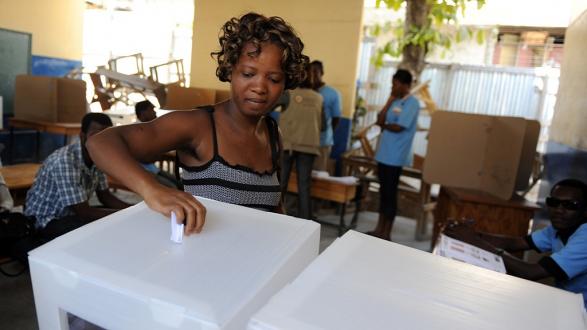In:
Global Beat is your weekly stop for news from around the world. Join us every Friday morning for important stories you should know about.
This week, Haiti gets ready for a new presidential election; a new report claims there are nearly 46 million slaves worldwide; the former president of Chad was convicted of crimes against humanity; and more.
____________________
Americas
A Haitian electoral commission recommended that the country’s presidential election be redone after looking through the votes from last October’s election and realizing that many were "zombie votes" that had no discernable person tied to them. The election has been in dispute ever since; scheduled run-offs in April were delayed and have yet to occur. An interim president, Jocelerme Privert, has been serving the island nation since February.
Also check out:
- Mexico recasts its criminal justice process – Juan Montes, Wall Street Journal
Central & South Asia
The Global Slavery Index, published this week by the Walk Free Foundation, cites India as having more slaves – 18 million in total – than any other country in the world. About 46 million people worldwide are enslaved despite the fact that slavery is illegal in every nation. The previous count by the Index in 2014 was 35.8 million. Contemporary slavery is defined by "any action in which a person is working or being held against their will – this can come in the form of forced child labor, human trafficking, or involuntary marriage."
Also check out:
- Southeast Asia and India struck by worst drought in decades – Jenny Soffel, World Economic Forum
China & East Asia
Chinese president Xi Jinping met with Ri Su-yong, a former North Korean foreign minister, current member of the politburo, and confidant of Kim Jong-un, one day after North Korea unsuccessfully tried to launch an intermediate ballistic missile, which could reach Japan and Guam. Ri reportedly told Xi that North Korea will not stop trying to develop nuclear weapons.
Also check out:
- The silencing of Japan’s free press – Martin Fackler, Foreign Policy
Europe & Russia
European Union Advocate General Juliane Kokott gave her opinion this past week that employers have the right to ban the wearing of crucifixes or headscarves in the workplace. The decision stems from a case brought to European courts last year when a company, G4S, fired a Muslim worker for wearing her headscarf during the workday. Kokott said, "The GS4 ban was an appropriate and proportional policy in line with the company’s objectives of religious and ideological neutrality." This opinion comes before a future European Court of Justice ruling on the subject, set to occur later this year.
Also check out:
- Tested by Russia, NATO struggles to stay credible – Steven Erlanger, The New York Times
Middle East & North Africa
Iraqi and coalition forces are attempting this week to take back the city of Fallujah from ISIL control with an assault that began early Monday morning. Conditions in Fallujah are grave for the city’s residents, who are trapped with no way to get out and subject to skyrocketing food prices ($850 for a bag of flour) and lack of access to health or sanitation services. The United Nations reports that over 20,000 children are in harm’s way as the city is battled over. ISIL took over Fallujah in 2014, and the city has been inaccessible ever since.
Also check out:
- How to run an international airport with jihadists on the doorstep – Peter Schwartzstein and Campbell MacDiarmid, Quartz
Southeast Asia & Oceania
Drought in Vietnam is deeply affecting rice farmers’ livelihoods in the region. Due to decreased rainfall from an El Niño weather pattern, they have seen their rice yields dramatically drop. Additionally, the Vietnamese government forces farmers to grow three rice crops a year, which is detrimental to the area’s soil, with saltwater increasingly infiltrating the rice paddies.
Also check out:
Sub-Saharan Africa
President Hissene Habre, the former president of Chad, was convicted this week in Senegal of gross human rights violations. He is sentenced to life in prison, stemming from charges of torture and abuse, raised against him regarding his administration’s rule from 1982 to 1990. He has been referred to as "the African Pinochet." Significant about the trial is the persistence and tenacity of the victims, who spent over two decades attempting to convict Habre.
Also check out:
- United States announces near-total ban on African elephant ivory trade – Ashley Alman, The World Post




